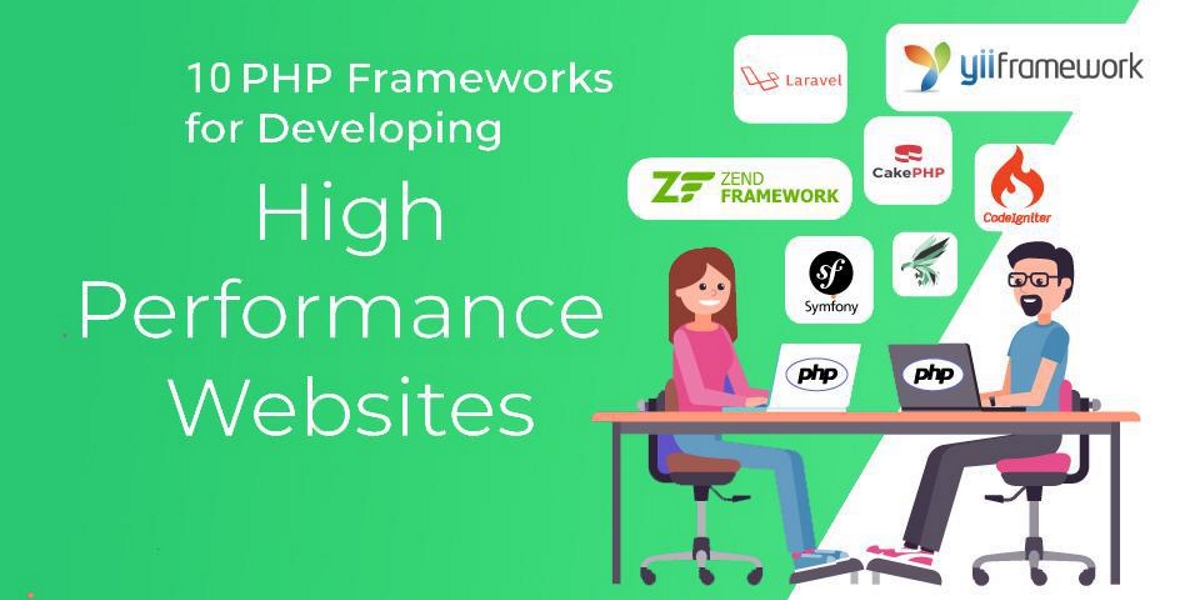
10 PHP Frameworks For Developing High Performance Sites
- By Yashraj Singh Shaktawat
- 16-10-2019
- Web Development
PHP is one in every of the foremost widely used programming languages used for developing websites and web apps. For years, this ASCII text file scripting language has been acclaimed for being stable and secure. However, it's evolved over a period of time. to start with, PHP developers wrote custom codes for each single practicality, that was a tedious task. At the time, they realized that they required an answer for this and came up with the thought of PHP frameworks.
Is PHP a framework?
First things first, you would like to understand whether PHP is a framework. basically, it is considered one as a result of it's all the specified website development components engineered into it by default. A PHP framework refers to a universal platform of reusable software that may be used for building websites and web apps of various sizes and complexities. It is explained as a library of codebase together with an identical way to prepare developers to make web solutions of their selection. These have rendered simplicity and ease for developers who do not need to rewrite the same code repeatedly for each page. Here are the reasons why app developers have faith in existing, proven PHP frameworks:
- The application of reusable, rectifiable code facilitates the speed of web development
- At a similar time, framework-based web apps supply the good thing about measurability
- It still guarantees a high level of security for the PHP web site
- They follow the Model-View-Controller paradigm, that ensures separation of presentation and logic
- Developers will adopt trendy web development practices like OOP with the utilization of those frameworks
Which is the best PHP framework?
After understanding the importance of PHP frameworks, it becomes vital to decide on the proper one. There are many choices of famous, well-maintained frameworks that are thought-about ideal for web development plan. the solution is basically subjective as what's best for you depends on what you're searching for.If you don’t know how to use or customize a php framework according to your needs, then anybody can hire php developer available in the market. Let’s have a glance at the choices you've got and you may most likely recognize the one that's best suited to you.
(1) Laravel
One of the newer frameworks, Laravel has well surpassed its rivals in quality. It comes packed with options that expedite the web development method. It offers a large ecosystem that comes with instant hosting and readying platform. Blade, the light-weight templating engine of Laravel, allows repeat tasks like authentication, sessions, caching, queuing, and relaxing routing. Laravel is additionally authorised with Homestead, the packaged Vagrant box that allows hassle-free development.
Why Laravel?
* Advanced MVC design
* Developer-friendly
* Amazing ORM
* Powerful question library
(2) Symfony
When it involves developing large-scale enterprise comes, Symfony makes an ideal selection amongst the PHP frameworks. Its scheme may be a large one, with an enormous set of reusable elements and a vigorous community of developers. The elements serve the aim of finishing various tasks like for creation, the configuration of objects, authentication, routing, templating, and far additional. These elements are used to power up comes like Drupal, Laravel, PHPBB, PIWIk, and OROCRM.
Why Symfony?
* Advanced options
* Easy testing
* Extensive community support
* Deal for large-scale applications
(3) Yii 2
Yii that happens to be one amongst the oldest PHP frameworks has come back up with its latest version Yii two to induce a much-needed quality boost. A strictly object-oriented framework, Yii two employs the lazy loading technique that makes it quicker than the others. It excels for large-scale web site development as a result of it will be integrated with Ajax and Jquery options. in addition, it offers Gii, the powerful code generator tool.
Why Yii 2?
* Simple configuration
* AJAX support
* Highly secure
* Support for third-party parts
(4) Zend
Featuring next on this list is Zend, which packs a spread of options like an easy drag and drop editor, cryptographical writing tools, a connected info Wizard, and instant on-line debugging tools. The climbable framework is good for advanced websites because it offers a myriad of configuration choices. However, it's one of the foremost difficult to learn.
Why Zend?
* Lightweight component library
* Simple learning curve
* SEO friendly
* Supports multilingual features
(5) CodeIgniter
CodeIgniter, a light-weight framework, is popular because it provides a hassle-free installation with minimal configuration necessities. Its ability to work smoothly on all shared also as dedicated hosting platforms adds to its quality. Not entirely supported MVC pattern, CodeIgniter offers flexibility to developers. they need the compulsion to use Controller categories however there's a choice for using Models and Views. other options include simple error handling, simple security and coding steps, and no PHP adoption struggle.
Why Codeigniter?
* Simple solutions for complex issues
* Excellent performance
* No giant monolithic libraries
* Clear documentation
(6) Phalcon
Phalcon excels in performance because it's supported C and C++. a simple to use and well-documented framework, Phalcon is loaded with exceptional options like plus management, universal auto-loader, translation, caching, and security.
Why Phalcon?
* Superlative performance
* Reliable security
* Lower memory consumption
* Autoloading mechanism
(7) CakePHP
Another wide appreciated member of this list is CakePHP, that brings speed, security, and dependability. it's been around for a decade currently however still holds high in terms of recognition. The credit goes to unbeatable options like SQL injection hindrance, cross-site request forgery (CSRF) protection, and cross-site scripting (XSS) hindrance.
Why CakePHP?
* Clean MVC conventions
* Flexible information access layer
* Easy code reusability
* Powerful staging
(8) Slim
Slim is a light-weight small framework that's relevant for tiny to medium websites, relaxing genus Apis, and services. Despite being minimalist in design, Slim comes packed with wealthy options like Client-side Http Caching, session and cookie routing, URL routing, and support for flash messages across Http request.
Why Slim?
* Broad and light-weight
* Ideal for developing REST APIs
* Well-organized documentation
* Easy template rendering
(9) FuelPHP
Next on this list is FuelPHP, a modular, extendable, and versatile PHP framework. the total stack framework supports the MVC pattern additionally as its evolved version hierarchical Model-View-Controller (HMVC). it's appropriate for delivering end-to-end website solutions of various sizes and complexities.
Why FuelPHP?
* Advanced authentication packages
* Extremely quick
* Enhanced safety features
* Built-in standard structure
(10) Aura
Aura contains a set of library packages, every of that is usable severally in any codebase. This framework has relevancy for developers preferring to write codes without wishing on a full-stack opinionative framework.
Why Aura?
* Self-contained library
* Extensive documentation
* High flexibility
* Swift Development
We know that PHP is one of the widely-used programming languages used for developing websites and web apps, it is regarded as one because it has all the required web development elements built into it by default. We know that there are so many companies that are using PHP as a first priority in web development.
Recent blog

Steps to Create a Successful Mobile Marketing Strategy
Digital Marketing | 08-05-2024
The Impact of Web Accessibility on Search Engine Optimization
SEO | 07-05-2024.jpg)




